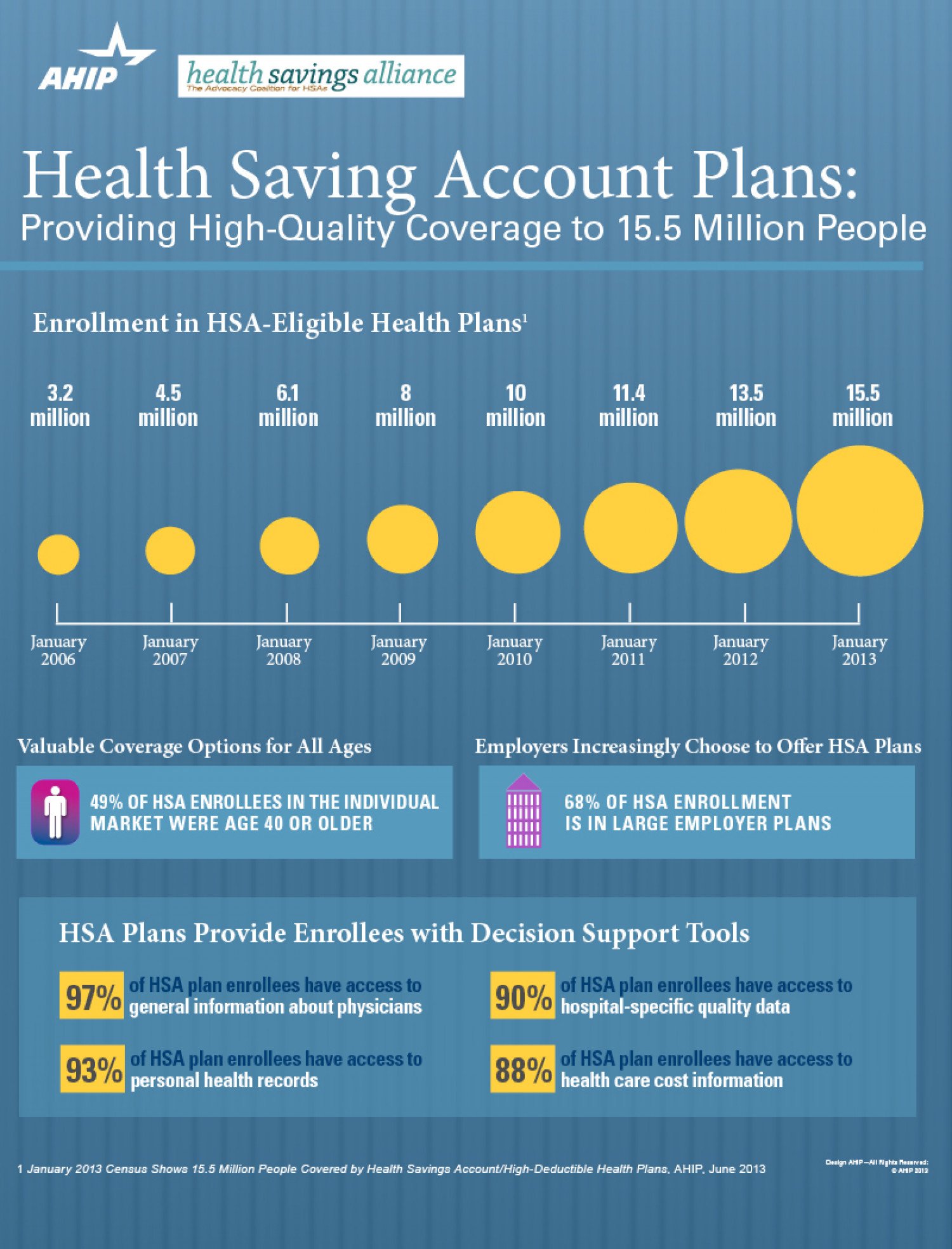What Is A Medicare Medical Savings Account
An MSA is a special type of Medicare Advantage plan with two components:
- A high-deductible health plan: This type of health plan requires you to pay an expensive annual deductible before your coverage benefits kick in. Specifically, you will pay full cost for any Part A or Part B Medicare-covered services until you spend a dollar amount equal to your deductible. After that, your plan will pay 100% of any covered services.
- A bank account set up by your health plan: Medicare funds this bank account with a fixed dollar amount every year. The amount varies based on the specific plan you choose, but will be less than your annual deductible. You can use these funds tax-free for qualifying medical expenses.
The Medicare Advantage plans associated with MSAs do not have prescription drug benefits. You will need to sign up for a stand-alone Medicare Part D plan if you want medication coverage.
Instances When You Will Not Receive A Penalty
For example, lets say that a married couple has health insurance through one persons employer. The employed person turns 65 years old but isnt planning to retire yet.
The couple can both stay on the employers health plan. If its an HSA-qualified plan, they can continue to contribute.
The couple can both enroll in Medicare when the employed person retires. Theyll qualify for a special enrollment period because theyll lose their prior coverage after retirement.
They wont be able to contribute to the HSA anymore, but they will be able to use funds from it toward future healthcare costs.
As in the example above, youll need to have a health plan in place to delay Medicare enrollment. Youll be charged a late enrollment penalty if you dont.
How To Set Up An Msa
Any person who qualifies for Medicare Parts A and B can also qualify for an MSA.
A person can sign up during their Initial Enrollment Period, which starts 3 months before their 65th birthday, lasts the whole of the birth month, and finishes 3 months after their birthday.
They can also enroll during Medicare Open Enrollment, which runs from October 15 to December 7 every year.
To find available MSA plans in a persons coverage area, a person can call 800-MEDICARE or search for an available Medicare plan.
Because MSAs are relatively new plans and less popular than other Medicare Advantage options, they are not available in many regions.
You May Like: Does Medicare Pay For Eyeglasses For Diabetics
Get Your Questions Answered About Medicare And Medical Savings Accounts
When enrolling in Medicare, its important to choose the right coverage for your healthcare needs and your budget. MedicareFAQ makes it easy by searching the top insurance companies in your area for the best rates. Let us help you find a plan. Call us at the number above, or fill out our form for an instant quote.
- Was this article helpful ?
Disclaimer: By clicking the button above, you consent to receive emails, text messages and/or phone calls via automated telephone dialing system or by artificial/pre-recorded message from representatives or licensed insurance agents of Elite Insurance Partners LLC, its affiliates or third-party partners at the email address and telephone number provided, including your wireless number , regarding Medicare Supplement Insurance, Medicare Advantage, Medicare Part D and/or other insurance plans. Your consent is not a condition of purchase and you may revoke your consent at any time. This program is subject to our Privacy Policy and Terms of Use. This website is not connected with the federal government or the federal Medicare program.
Still Have Questions About Medicare Advantage Msa Plans

I am happy to give you more information and answer your questions. If you prefer, you can schedule a phone call or request an email by clicking on the buttons below. You can also find out about Medicare Advantage plan options in your area by clicking the Compare Plans button.
New To Medicare?
Becoming eligible for Medicare can be daunting. But don’t worry, we’re here to help you understand Medicare in 15 minutes or less.
Also Check: How Old Before Eligible For Medicare
Medicare Medical Savings Account Plans
Home / FAQs / Medicare Advantage / Medicare Medical Savings Account Plans
A Medicare Medical Savings Account Plan combines a high-deductible Medicare Advantage plan with a Medical Savings Account, or MSA. It works much like health savings account plans for people with individual or employer-sponsored insurance.
Medical Savings Account Vs Fsa
Another popular type of tax-advantaged savings account you can use to pay for medical expenses is the flexible spending arrangement . These plans are popular because employment and federal income tax are not deducted from your FSA contributions, and employer contributions can be excluded from your gross income. However, money your employer contributes for long-term care insurance has to be counted as income.
The main, underlying similarity between FSA and MSA plans is that distributions of your FSA or MSA are tax-free as long as they are used on qualified medical expenses. However, there are many differences between FSAs and MSAs, of which the main ones are outlined in the chart below.
| MSAs vs. FSAs: How They Compare |
| MSAs |
Also Check: Does Medicare Cover Dexcom G6 Cgm
How Does A Medical Savings Account Work
The MSA plan combines a savings plan with high-deductible coverage. The savings can pay for healthcare costs. Medicare gives the plan money to handle your claims then, the plan deposits some of that money into your MSA.
Beneficiaries cant add their own funds to the MSA. Most beneficiaries use funds to cover the costs before the deductible is met.
If there are funds in the account at the end of the year, they remain in the account as long as youre enrollment status remains active the following year. Also, funds from MSAs grow tax-free and free of interest. These plans are best for those in good health with only a couple of doctor visits annually.
The deductible and deposit amount depend greatly on the policy you select. Also, not all costs count toward the annual deductible. The costs must relate to Part A or Part B. Beneficiaries will need to purchase additional Part D coverage.
What Can I Use The Money In My Medical Savings Account For
The money your plan deposits in your account, plus any interest you may earn from it, belongs to you and is typically not subject to any income tax. Technically, you can spend the money in your Medicare MSA on anything you choose. However, if you spend it on non-qualifying expenses, it will be subject to federal and state income tax plus a 50% tax penalty.
You May Like: Does Medicare Cover Bed Rails
How Medicare And Health Savings Accounts Work
Health Savings Accounts help pay for deductibles, coinsurance, copayments, and other medical expenses. Once the money goes into the Health Savings Account account, you can withdraw it for any medical expense, tax-free. Additionally, you can earn interest, your balance carries over each year, and this can become an investment for a retirement fund. Unfortunately, some restrictions come along with having a Health Savings Account with Medicare.
HSA is only for those enrolled in a high-deductible plan. Since Medicare is not considered an HDHP, enrolling makes you ineligible to contribute to an HSA.
Once you enroll in Medicare, its illegal to continue to contribute to a Health Savings Account. The only exception to continue contributing to your HSA is to postpone enrolling in Medicare. As long as you have creditable coverage through your employer, you wont be penalized for delaying your enrollment.
Before you assume your employer coverage is considered , make sure to talk to your benefits administrator. If your employer has less than 20 employees, it wont be considered creditable coverage.
Can A Medical Savings Account Be Used For Medicare Premiums
Most enrollees dont have a premium other than for Part B, which varies by income. The beneficiary is responsible for the Part B premium. If you had a Health Savings Account, while you cant contribute funds while in Medicare, you can use those funds to pay premiums.
The HSA can pay for Part B premiums, Medicare Advantage premiums, Part D premiums, long-term care insurance, copayments, and deductibles. HSA accounts cant pay Medicare Supplement Plan premiums.
You May Like: How Much Does Medicare Pay For Hospice
How An Msa Works
You can use your MSA to pay for services right away. You do not have to wait until you spend the full deductible amount out of your own pocket. In fact, any money you spend for Medicare-covered services from this account will help pay down your deductible.
There are, however, some rules for the bank account you need to know about. You cannot add funds to this account yourself, though you can withdraw funds at any time. This account accrues interest, and any unused funds roll over to the following calendar year.
Any money from this account used to pay for qualified health expenses will be tax-free, but using it to pay for expenses that do not qualify could literally cost you. You could face a 50% tax penalty for non-qualifying expenses.
Medicare Medical Savings Accounts

As of 2021, a Medicare MSA is available with a high-deductible Medicare Advantage plan . The MA plan deposits funds to the insured’s MSA, allowing the insured to use the funds to pay for medical care even before the deductible is reached. The Medicare MSA is similar to an HSA, allowing users to choose their healthcare providers and services. However, although Medicare MSA funds may be used for services not covered by Medicare, only the cost of Medicare services will be counted towards meeting the deductible.
For an extra cost, some Medicare MSAs cover extra benefits not covered by the MA Planfor example, dental care, vision care, hearing aids, and long-term care. However, Medicare MSAs do not cover prescription drugs. Enrollment in Medicare Part D is required for Medicare coverage of prescription drugs.
People who are enrolled in a Medicare MSA can use funds from the account to pay for medical expenses even before reaching the high deductible of their insurance plan.
Don’t Miss: How Much Do Medicare Supplements Increase Each Year
What Can The Money In An Msa Be Used For
The member can use the money toward Medicare approved services or other Qualified Medical Expenses that are not covered by Medicare. An example of non-Medicare approved QMEs are services such as dental, vision, and hearing.
Prescription drugs are not considered QME. Only the amount spent on Medicare approved services will go toward the annual deductible.
Medicare Advantage Prescription Drug Coverage
While most Medicare Advantage plans offer some type of drug coverage, participants also have the option of joining separate prescription drug coverage plans if their plan does not provide these types of benefits. This is often the case with MSA and some PFFS plans.
That being said, its important to note that Medicare.gov does advise that if a participant enrolls in a Medicare Advantage HMO or PPO and joins a separate Medicare Prescription Drug Plan, he or she will be disenrolled in Medicare Advantage and returned to Original Medicare.
For this reason, its important to understand which type of drug coverage you need, as well as which plan offers the best benefits regarding that particular prescription.
Recommended Reading: How Do I Find My Medicare Card Number Online
Medical Savings Accounts Vs Hsa
Medical savings accounts and health savings accounts are both tax-favored health plans that can help individuals on high-deductible health plans offset healthcare costs. MSA and HSA plans share the following benefits:
- You can claim a tax deduction from contributions made to your HSA or MSA without itemizing your deductions.
- Contributions remain in your HSA or MSA account until you use them, and the accounts are portable you can take it with you from employer to employer.
- Interest you earn from assets in your HSA or MSA account is tax-free.
- Distributions of your HSA or MSA are tax-free as long as you use them on qualified medical expenses.
While there are many similarities between the two, HSAs are much more flexible and more widely available. The chart below breaks down the biggest differences between HSAs and MSAs, aside from their differing eligibility requirements, which are noted above.
| Archer MSA vs. Medicare Advantage MSA vs. HSA | ||
| Archer MSA | ||
|
|
|
How Do Medical Savings Accounts Work
A medical savings account is a tax-advantaged account in some Medicare Advantage plans with high deductibles. MSAs resemble the health savings accounts available to members of non-Medicare high-deductible health plans . Medicare funds MSAs with tax-free contributions, and interest earned by funds in the accounts is also not taxed. MSA owners can withdraw funds tax-free as long as the money goes to pay for qualified medical expenses. A financial advisor can help you assess your needs and plan for meeting those needs so find an advisor today.
MSA Background
Medical savings accounts began appearing in the 1990s when states organized them to help people pay for medical costs with untaxed dollars. The federal Archer MSA came next. HSAs replaced Archer MSAs beginning in 2003, the same year Medicare MSAs became legal. Medicare MSAs were first offered to Medicare enrollees in 2007.
Medicare enrollees have been slow to sign up for MSAs. Of 64 million people on Medicare in 2019, 22 million were enrolled in Advantage plans, but only 5,600 were on MSA plans, according to the Kaiser Foundation.
Medicare MSA plans are not available at all in most places. At time of writing, only four companies offer MSAs, and the plans are for sale in only 29 states.
Requirements for an MSA
How MSAs Work
MSAs and Taxes
Bottom Line
Tips on Healthcare and Retirement
Read Also: Is Eliquis Covered Under Medicare
Medicare Msa Plan Eligibility
You must be enrolled in Medicare Part A and Part B in order to be eligible for a Medicare Medical Savings Account.
Many Medicare Advantage plans do not allow enrollment for beneficiaries who have End-Stage Renal Disease . Some Medicare Advantage plans called Medicare Special Needs Plans may grant you enrollment if you have ESRD.
Coverage Under Msa Plans
Medicare MSA plans cover the same Medicare services that all Medicare Advantage plans must cover.
However, only expenses that are related to Medicare Part A and Part B count toward deductibles.
Some MSA plans may cover other benefits such as dental, vision and long-term care at an extra cost.
These additional services do not count toward your plans deductible.
MSA plans do not offer Medicare prescription drug coverage. However, you can join a stand-alone Medicare Part D prescription drug plan.
Enrollees do not pay a premium for MSA plans, but you will still be required to pay your monthly Medicare Part B premium.
Don’t Miss: What Is The Extra Help Program For Medicare
Costs For A Medical Savings Account Plan
Premiums vary for Medical Savings Account plans but, you must still pay the monthly Part B premium. Your out-of-pocket costs will vary depending on the plan youre enrolled in and the way you spend the money in your Medical Savings Account. Different plans will have different deductibles, and the amount of money Medicare deposits in your account will also vary.
For example, you might have an MSA plan with a $4,000 deductible and Medicare depositing $2,500 into your MSA each year. If you spend the entire $2,500 on Medicare-covered medical expenses, you will have met $2,500 of your deductible. If you have additional medical expenses, you can spend $1,500 of your own money before Medicare pays.
Suppose you spent the $2,500 in your MSA differently. $1,500 on the dentist and $1,000 on medical expenses. Only the $1,000 counts toward your deductible so, you must spend another $3,000 on medical expenses. Then, you satisfy the deductible and Medicare pays. Once you have reached your deductible, however, the MSA plan will pay for all services covered by Medicare.
The Medicare Savings Account Plan Special Bank Savings Account

The savings account part of a Medicare MSA plan is self-managed like any other bank savings account. One main difference is that the account is funded with money from Medicare versus by you.
Medicare gives Medicare Advantage plan sponsors a set amount of money for each beneficiary covered by the plan. The plan then uses the money to pay the Medicare-covered portion of the plan members health care costs.
When you have a Medicare MSA plan, the plan provider deposits the money it receives from Medicare into a savings account that you manage. You then become responsible for paying the Medicare-covered portion of your health care costs, instead of the plan. In effect, you must pay 100 percent of the cost for Medicare-covered services up to the plan deductible.
You may withdraw money from this account tax free and use it to help pay qualified medical expenses. Qualified expenses are defined by the Internal Revenue Service . This includes costs for services covered by Medicare Part A and Part B and some other expenses.
The plan deposits funds from Medicare into your account at the beginning of each year. The amount can vary. Funds may earn tax-free interest or investment income, and the balance carries over year to year.
You may not deposit your own money into a Medicare MSA. Funds withdrawn and used to pay non-qualified expenses are taxed and a penalty is also applied.
Recommended Reading: Does Aspen Dental Accept Medicare